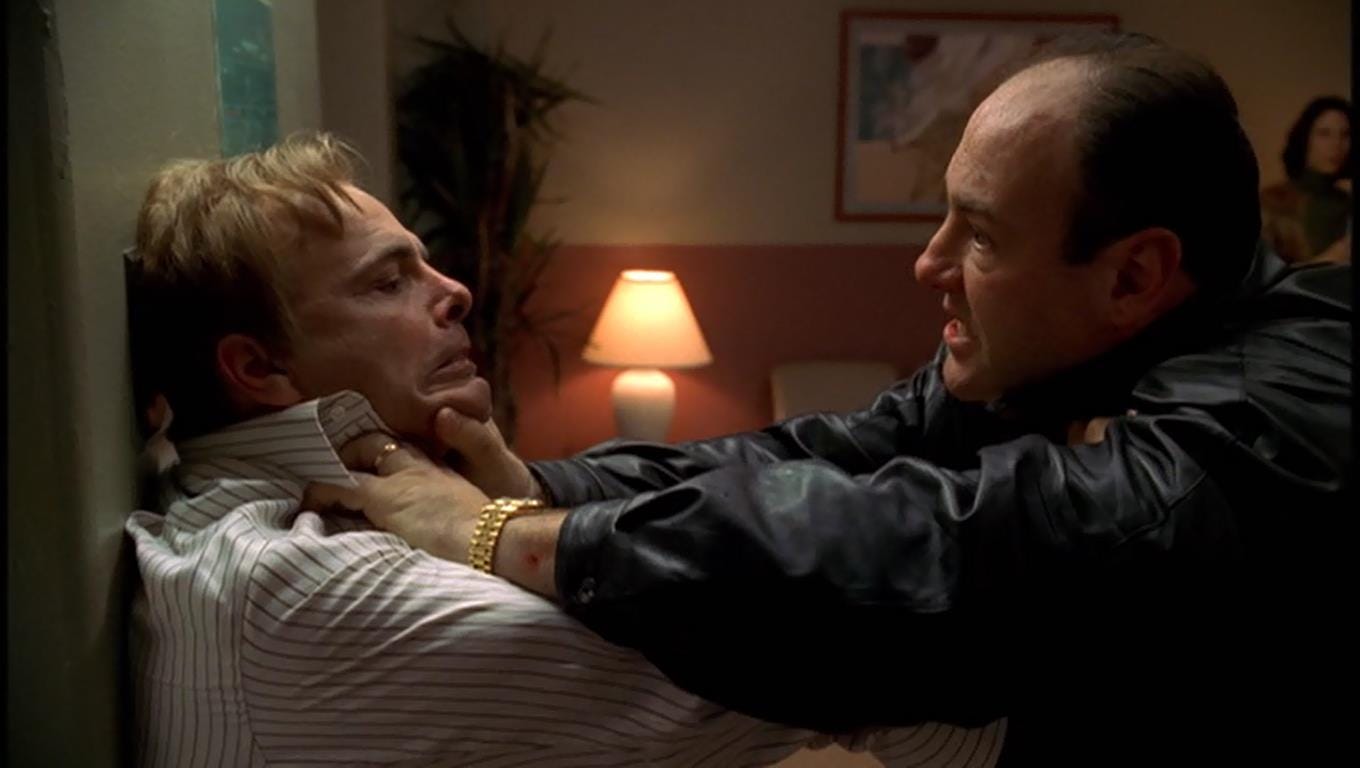
“Whoever Did This” is an iconic Sopranos episode that’s far weirder, structurally, than any short summary of it would indicate. It gets boiled down to its most intense act of violence — the kind of act that David Chase resented parts of his audience for craving — but that standout moment is surrounded by the narrative experimentation and rigorous interpersonal study that those same parts of the audience resented David Chase for forcing upon them. It’s an uncomfortable compromise, and an uncomfortable episode — one that leaves you feeling gross about getting something you’ve wanted for a long time.
While some might claim the whole episode orbits around a bald, severed head inside a bowling bag, I think it’s structured around moments that arrive in sets of three. There are three physical fights: the fight in the hospital waiting room, the play-fighting between Tony and AJ in the Sopranos’ kitchen, and the final confrontation between Ralphie and Tony. The first and the third are clearly connected; both culminate in Tony choking Ralphie, and they drive the same plotline forward. The second defies that pattern, but it’s thematically vital, as it provides a long-delayed AJ-Tony vibe check.
Father-son interactions have been minimal since AJ’s expulsion — a side effect of Tony’s frequent absences from the Soprano house. But AJ isn’t exactly clamoring for his dad’s attention either. He doesn’t want to play-fight, doesn’t want to talk about his girlfriend, and certainly doesn’t want to sit at the island eating French toast for breakfast. AJ’s dietary fastidiousness is a rejection of his mother’s doting, but it’s also a way to assert himself as unlike his father, who’s been notably more indulgent on that front throughout this season. Their non-confrontation brings together as many disparate details as the two big, real fights do, but to far less conclusive ends. The last substantive AJ-Tony interactions — “Army of One” and “Watching Too Much Television” — suggested that AJ was doomed to become exactly like Tony, that his fate is inescapable. But their verbal spat here destabilizes that idea, where the physical ones tie a bow on a set of conflicts that have stretched out for a season and a half.
There are also three bathing scenes, and again, two are visually similar while one stands out on its own: Ralphie in the tub while his son Justin is shot by an arrow, Tony showering after the murder scene clean-up, and Christopher showering after the murder scene clean-up. Same goes for the passing references to “Sympathy for the Devil,” two of which are spoken by Ralphie and one of which is spoken by Fr. Phil. (I assume those are intended to drive the themes of redemption and evil home for those who weren’t raised Catholic and might not have picked up on shit like the trinities, the ablutions, and the very subtle goat staring into the camera.)
There are also three notable absences of the women in Tony’s life: he doesn’t go to therapy, he spends the night on the couch at the Bing after killing Ralphie, and Meadow never appears. In fact, I think the only acknowledgment of Meadow’s existence is that Carm wears a Columbia University t-shirt in one scene. And Carm herself is only present early in the hour to set up the moment where Ralphie politely tells Tony that his wife is the only thing keeping him from being as horrible as Ralphie. Otherwise, she’s off-stage — and intentionally so, as Tony goes out of his way to avoid being visible to the women whose perceptions of him matter.
But most importantly, there are three incidents about which Tony says “whoever did this”: the prank call to Paulie’s mother, the maybe-accidental electrical fire that results in Pie-O-My’s death, and the murder of Ralphie. Again, there’s a matched set of two and an outlier here. We see who made the prank call; we see who murdered Ralphie. But we have no idea who (if anyone) started the stable fire. Like Tony, I’m inclined to think that Ralphie did it, partially because he’s awful, but mostly because of all the financial concerns presented in both this episode and the season as a whole. But I always second-guess myself during their final confrontation, because Joe Pantoliano plays Ralphie’s protestations so convincingly — and because every Ralphie moment that’s led up to this point has made it impossible to tell when he’s lying.
But ultimately, it doesn’t matter whether Ralphie killed the horse, because [extremely James Kennedy “it’s not about the pasta” voice:] it’s not about the horse.

